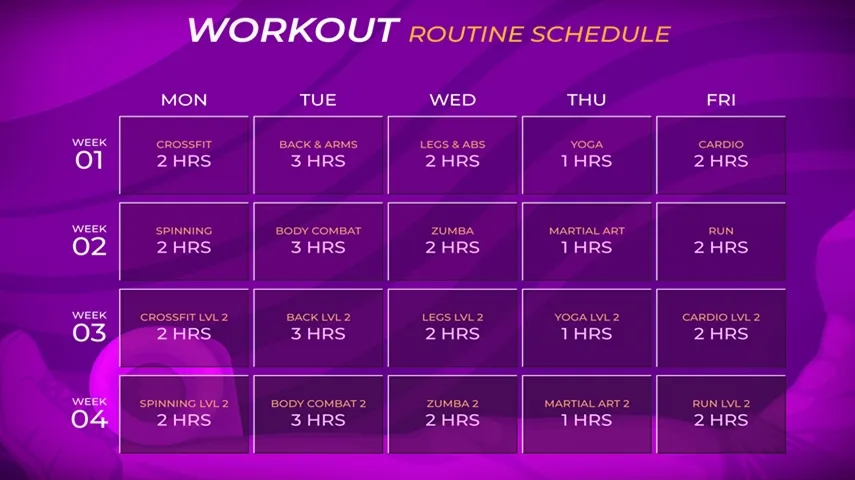Why a Weekly Fitness Plan is Essential
Have you ever started a workout schedule only to quit after a few weeks? A well-structured weekly fitness plan helps you stay consistent, motivated, and on track toward your fitness goals. Without a clear plan, it’s easy to skip workouts, feel unmotivated, or fail to see progress. Whether you want to lose weight, build muscle, or just maintain an active lifestyle, a personalized fitness plan can set you up for success.
By designing a balanced workout routine, you ensure that your exercise routine includes strength training, cardio, and flexibility workouts. Plus, a structured fitness program eliminates guesswork and helps you achieve measurable results.
Step 1: Define Your Fitness Goals
Before creating your weekly fitness plan, ask yourself: What do you want to achieve? Defining clear fitness goals will help you design a plan tailored to your needs.
Common Fitness Goals:
- Weight loss plan: Focus on calorie-burning exercises like cardio and high-intensity interval training (HIIT).
- Muscle-building program: Prioritize strength training and progressive overload techniques.
- Improved endurance: Incorporate long-duration cardio workouts such as running or cycling.
- Overall health and wellness plan: Mix strength training, cardio, and flexibility workouts.
Once you identify your goal, you can build a personalized fitness plan that aligns with your ambitions.
Step 2: Determine Your Workout Schedule
Consistency is key to fitness success. Decide how many days per week you can realistically commit to exercise.
Recommended Weekly Workout Plan:
- 3-4 days per week: Great for beginners or those with limited time.
- 5-6 days per week: Ideal for those aiming for faster progress.
- 7 days per week: Suitable for advanced fitness enthusiasts but requires variation to prevent burnout.
Your exercise routine should be flexible but structured enough to keep you accountable.
Step 3: Choose Your Workouts Wisely
A balanced workout routine includes different types of exercises to maximize results and prevent overuse injuries.
Essential Workout Types:
- Strength Training Plan: Lifting weights or using resistance bands to build muscle.
- Cardio Schedule: Running, cycling, swimming, or jump rope workouts for heart health.
- Flexibility & Mobility Training: Yoga or stretching exercises to improve movement and prevent injury.
A mix of these workouts will ensure your training regimen covers all aspects of fitness.
Step 4: Structure Your Weekly Routine
A well-organized weekly workout plan helps you stay on track. Here’s an example of a structured gym routine:
Sample 5-Day Weekly Fitness Plan:
- Monday: Upper body strength training
- Tuesday: Cardio (running or cycling)
- Wednesday: Lower body strength training
- Thursday: Active recovery (yoga or stretching)
- Friday: Full-body HIIT workout
- Saturday: Outdoor activity or fun sport
- Sunday: Rest or light movement (walk or swim)
Adjust based on your fitness level and goals.
Step 5: Track Your Progress
A fitness tracker or journal helps you stay accountable and measure improvements.
Ways to Track Progress:
- Use a fitness tracker or smartwatch.
- Keep a workout journal to log sets, reps, and weights.
- Take progress photos every few weeks.
- Measure body stats (weight, muscle mass, body fat percentage).
Monitoring your progress will keep you motivated and help you adjust your structured fitness program if needed.
Step 6: Stay Flexible and Adjust When Needed
Your flexible workout schedule should evolve as you progress. If something isn’t working, tweak your training regimen accordingly.
Signs You Need to Adjust:
- You’re constantly sore or fatigued.
- You’re not seeing progress after several weeks.
- Your workouts feel too easy or too hard.
- You’re feeling unmotivated or bored.
Modify your exercise routine to keep things fresh and challenging.
Step 7: Keep Yourself Motivated
Staying committed to your weekly fitness plan can be challenging, but motivation is key.
Tips to Stay Motivated:
- Set realistic mini-goals: Celebrate small victories along the way.
- Find a workout buddy: Having a partner can keep you accountable.
- Switch up your routine: Try new workouts to keep things exciting.
- Reward yourself: Treat yourself when you hit milestones.
Consistency and enjoyment are crucial for long-term success.
Take Charge of Your Weekly Fitness Plan Today
Designing a weekly fitness plan that works for you is about setting clear goals, maintaining consistency, and keeping things flexible. By following these seven steps, you’ll create a structured fitness program that helps you stay on track and achieve real results.
Ready to kick-start your fitness journey? Check out the best workout gear and fitness trackers here to help you stay on top of your game!





